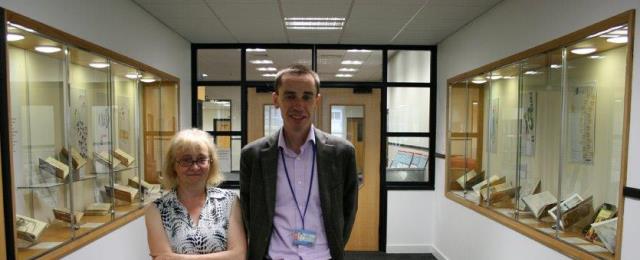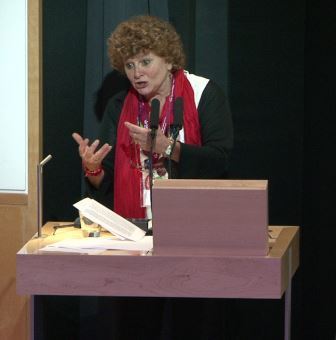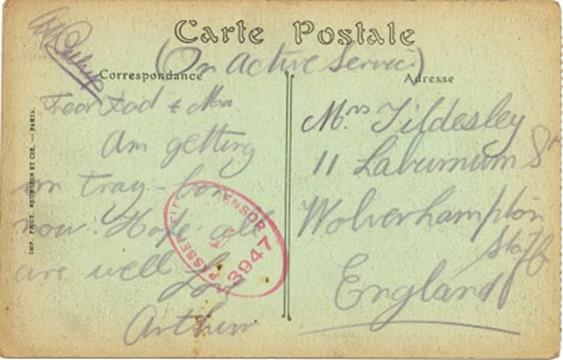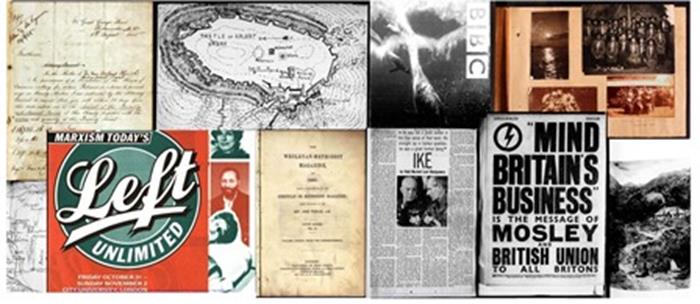2014 saw British Library curators working across diverse themes, including: sport, law, language, gender, ageing and democracy. Through conferences, exhibitions, workshops and collection development, we worked with a range of audiences, uncovering new insights to our collections and learning more about contemporary research. Here are some highlights:
The annual Chartered Management Institute/British Library Management Book of the Year awards ceremony was held in the British Library conference centre on the 3rd February 2014. Details of the category winners can be found on the CMI website along with videos which summarise each of the books. The videos were produced by students from Ravensbourne College of Design and Communication. The overall winner for 2014 was The Ten Principals behind Great Customer Experience by Matt Wilkinson. We look forward to participating in the 2015 awards ceremony, which takes place on the 9th of February this year.
As part of the public events series linked to the Beautiful Science: Picturing Data, Inspiring Insight exhibition, we held a public discussion ‘Beyond Nature versus Nurture’. This event brought together social scientists and scientists to discuss how the nature versus nurture debate has been revolutionised by the study of Epigenetics and to debate the moral, ethical and social consequences of the growing understanding of how nurture affects nature. The speakers were Professors George Davey-Smith and Nikolas Rose. The evening was chaired by Professor Jane Elliott. The discussion is available as a podcast and can also be watched on the library’s Youtube channel.
To mark Le Grand Départ of the Tour de France 2014 from Yorkshire, members of the team, with colleagues from across the library, curated and installed a display of collection items at the library’s Boston Spa site near Wetherby. The display included accounts of the early days of cycling as a mass pastime and sport, including an 1897 description of a ‘bicycle gymkhana’, more recent journalistic accounts of the legendary cycling extravaganza, typographical prints responding creatively to the 2011 Tour de France – including Mark Cavendish’s Green Jersey win – and the original manuscript of Tim Moore’s best-selling French Revolutions, his 2001 account of cycling the entire 3,630km route of the 2000 Tour de France.

Gill Ridgley and Robert Davies following the installation of Le Grand Tour exhibition at Boston Spa
In addition to the exhibition there was a ‘peloton’ of blogs written by staff including 'Pedal Power' which explored how patents held by the library shed light on the technical development of the bicycle over the last two hundred years and ‘Escorting Stoller's Depart' which reports on the Tour de British Library when members of staff cycled from St Pancras to Boston Spa to mark the start of the Tour de France.
In April we held a one day conference Portraying Ageing: Cultural Assumptions and Practical Implications in partnership with the The School of Language, Linguistics and Film – Queen Mary, University of London and the Centre for Policy on Ageing. The conference brought together experts from different backgrounds to share and discuss, from a variety of theoretical and practical viewpoints, how age and ageing are not only biological events but also cultural and social constructions and how insights from research can be translated into policy and practice. They keynote address was given by Professor Lynne Segal, Anniversary Professor of Psychology & Gender Studies at Birkbeck, Guardian Columnist and author of ‘Out of Time: The Pleasures and the Perils of Ageing’. The conference was filmed and the videos can be accessed via a page on the Social Welfare Portal. An overview of the day is also available via the ‘Age is in the eye of the beholder' blog post.

Professor Lynne Segal delivering the keynote address at the Portraying Ageing Conference.
We were delighted to hold the Fourth Annual Equality lecture in association with the British Sociological Association. This year our speaker was Dr Tom Shakespeare, a senior lecturer in medical sociology at the University of East Anglia and disability rights advocate. Tom’s research interests centre on disability studies and bioethics and his publications include: The Sexual Politics of Disability (1996), Genetic Politics (2002) and Disability Rights and Wrongs (2006). He has worked at the World Health Organization in Geneva where he helped write and edit the World Report on Disability (WHO 2011) and has been involved in the disability movement for 25 years.
The theme of Tom’s talk was ‘Enabling Equality: from disabling barriers to equal participation’ and explored what it takes to achieve equality for disabled people, in the era of the UN Convention on the Rights of Persons with Disabilities and ‘welfare reform’. The lecture is available on our podcast page and as a video on the British Sociological Association’s vimeo channel.
Members of the team assisted colleagues from across the library in the planning and delivery of the Languages and the First World War International Conference which was held in association with the University of Antwerp and timed to coincide with the opening of the library exhibition Enduring War: Grief, Grit and Humour. The conference aimed to study how the languages of combatant nations influenced each other; the use of trench slang to both include and exclude individuals; censorship and propaganda; the development of interpreting as a profession; personal communication and silence during and after the war and how the First World War still influences how we all speak today. The speakers represented a range of academic disciplines and were drawn from across Europe, North America and Australia. The programme and related blogs can be found on the dedicated conference tumblr page. Some of the twitter feed from the conference is available via Storyfi.

Postcard home: Arthur Tildesley writes to his Mother and Father that he is 'tray bon'.
In June we hosted the inaugural English Grammar Day, which was inspired by renewed political interest in the role of grammar in English teaching and assessment and debates about the cultural and educational significance of knowledge about grammar. EGD 2014 was a sell out event and a forum for reflections on the state of, and attitudes towards, English grammar – in school and beyond – with public contributions encouraged in the form of a lively ‘Any Questions’ style Panel session. The event brought together academic linguists, teachers, PGCE students, teacher trainers and non-specialists and we look forward to hosting EGD 2015 on June 29 and making this an annual event.
The year also saw British Online Archives made available via remote access for British Library readers. This is an online platform which brings together digitised images, and descriptions, of collections held in archives and libraries from across Britain. Collections include the BBC Handbooks and Listener Research, Parliamentary Labour Party records, missionary and colonial papers (recording some of the earliest contacts between Europeans and the populations of Africa, the Americas, and the Pacific), and the archive of the Communist Party of Great Britain. More information on some of the material available via the service can be found in an earlier Social Sciences blog post.
Holders of British Library Reader Pass can now access these collections from outside our Reading Rooms, using our Remote e-Resources service at https://eresources.remote.bl.uk:2443/login

Images taken from British Archives Online.
In partnership with the Institute of Advanced Legal Studies and the Socio-Legal Studies Association we held the third national socio-legal training day. The theme this year was Law, Gender and Sexuality. The day aimed to draw attention to archives and content which newcomers to the investigation of intersections between law, gender and sexuality may not be aware of and to consider the methodological and practical issues involved in analysing sources. Information about the programme and details of speakers can be found here and overviews of the day can be found here and here.
We also launched our new series of public discussions ‘Enduring Ideas’ in partnership with the Academy of Social Sciences. The series aims to explore some of the key concepts which underpin society. In the first event, Professor Matthew Flinders, University of Sheffield and author of Defending Politics, discussed ‘Enduring Ideas: The Problem with Democracy’.
During the evening Professor Flinders asked and addressed many questions: does the apparent shift from healthy scepticism to corrosive cynicism have more to do with our unrealistic expectations of politics than a failure of democratic politics? Do the problems with democracy – if they exist – tell us more about a failure on the part of the public to understand politics rather than a failure of politicians to understand us? Is the problem with democracy is not that it is in short supply but that we have too much of it? He went on to suggest new ways of thinking about politics to ensure not the death but the life of democracy. A podcast of the talk is available here.
Naturally, this post only provides a snapshot of some of the activities we were involved in, in 2014. We’ve enjoyed working with colleagues from across academia; libraries; archives; third sector organisations; professional bodies such as the Academy of Social Sciences, British Sociological Association and the Sociological Research Association, enormously. It has also been a great way to meet so many members of the public. We’re already looking forward to a new Enduring Ideas discussion, Talk Science, the Annual Equality Lecture and more in 2015. Keep an eye on What’s On for events.